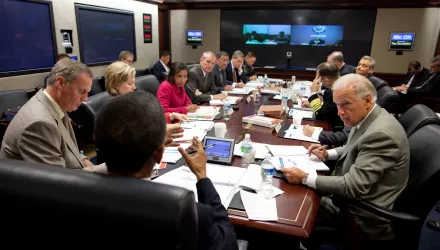Note
This op-ed originally appeared in Hebrew. The following translation has been provided by the author.
The agreement to dismantle Syria's chemical weapons was recently formalized in a Security Council resolution and the actual dismantlement process began last week. Despite concerns over his decision-making process, President Obama ultimately achieved an optimal outcome, far more than could have been attained through military action. What initially appeared to be a case of failed decision-making ultimately turned out to be a successful application of coercive diplomacy, without recourse to force, and an historic achievement may now be possible regarding the Iranian nuclear program as well.
Superpowers' interests and constraints are different from those of regional players, but the American modus operandi is one that Israel should study carefully. Israel, for example, responded almost automatically to the Hezbollah provocation in July 2006 that led to the war, even though the government knew in advance that there was no possibility of achieving its stated goal, freeing the abducted soldiers through military means, that we did not have an effective military response to Hezbollah's short-term rockets and that the home-front was not protected. Should we not have considered coercive diplomacy, massed forces along the border, and issued a clear ultimatum—return the hostages and accept security arrangements to prevent renewed incidents, or we will destroy Lebanon's infrastructure and Hezbollah's capabilities? Might this not have been appropriate, especially since the war ultimately ended with their acceptance of demands that Israel had formulated at the war's outset (deploying the Lebanese army in the south, limitations on Hezbollah's freedom of maneuver and a strengthening of UNIFIL)?
In operations "Cast Lead" and "Defensive Pillar" in Gaza in 2008 and 2012, respectively, Israel faced similar situations—rocket fire on civilian communities, limitations on maneuver in heavily populated areas, and concern over the international response. In these cases, too, we could have concentrated forces and posed an ultimatum—agree to a prolonged cessation of rocket fire, or we will act. Had we done so, international and regional actors would probably have intervened to end the crisis and were we ultimately forced to act, nevertheless, we would have enjoyed broader international support.
As a small country surrounded by bitter enemies, with limited security margins, Israel has manifested a clear preference over the years for rapid military solutions, while minimizing the diplomatic dimensions of our national security policy. We have always believed that we must respond rapidly and strongly to every Arab use of force, transfer the fighting to enemy territory, achieve decisive military victory, and thus deter our enemies from further hostilities. We hoped that repeated victories would lead to "incremental deterrence" and ultimately to Arab recognition of the futility of of their military ambitions. This preeminent objective of our national security policy has been achieved impressively: Egypt and Jordan made peace with us, and the rest of the Arab countries have long forgone any practical aspiration to destroy Israel, focusing instead on regaining the 1967 territories.
In practice, Israel has been forced to forgo conquest of further territory in all of the military campaigns since 1982 in order to avoid annexation of additional hostile populations, while the asymmetric character of the warfare has made it difficult, or impossible, to achieve a clear victory. In these circumstances, we were forced to make do with limited campaigns designed to achieve a temporary strengthening of our deterrent posture, and at times not even this.
Israel of 2013 is a strong and secure country, certainly compared to the past. The countries around us are falling apart, and we no longer face existential threats (unless, possibly, if Iran goes nuclear). Hezbollah, Hamas and their ilk can cause us significant damage, but not threaten our fundamental security, and the primary threat they present is to buildings, infrastructure, and the economy, rather than a loss of lives. This is bad enough, but the threat is limited, and we have learned to deter Hezbollah and Hamas and to bring about prolonged cessations of hostilities. The eagerness to undertake military action against Syria and Iran, when neither we nor the United States truly have an effective military response, is inappropriate.
The U.S. achievement vis-à-vis Syria, and now possibly Iran, are but two of the many reasons why Israel must reassess its national security doctrine and modus operandi. We must learn to demonstrate greater restraint, an ability to absorb and take a longer-term perspective. We no longer have to respond to every provocation, however painful, our future is ensured and the international cost, as well as the dangers of a broader deterioration and the ramifications for the peace treaties with Egypt and Jordan, require restraint. Adoption of a security doctrine based on greater restraint and a more defensive posture, while attempting to apply coercive diplomacy in those cases that do require a response, may obviate the need to launch future military operations and improve Israel’s international standing, a vital but neglected aspect of our national security policy. We can always unleash our iron fist.
The writer, a former deputy national security adviser in Israel, is the author of Zion’s Dilemmas: How Israel Makes National Security Policy, 2012
Freilich, Chuck. “What Is Good for Obama Is Good for Us Too.” Haaretz, October 5, 2013





